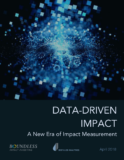A new market study released today from Distilled Analytics and Boundless Impact Investing finds that despite the rapid growth of assets in impact investing, effective measurement of such investments are still elusive due largely to the lack of accurate, accessible data and outdated measurement methods. The analysis, entitled, “Data-Driven Impact: A New Era of Impact Measurement,” addresses the $23 trillion of assets managed under sustainable and impact strategies that need reliable evaluation, and uncovers how the industry can combine reliable data with innovative machine learning advancements to empower investors, drive more capital into impact sectors, and produce improved environmental and social outcomes. To read the full report visit www. distilledanalytics.com/impact-report.
Measurement matters
The field of impact measurement ultimately empowers investors to make better decisions and drive more capital into impact sectors, producing meaningful environmental or social outcomes. The study from Boundless Impact Investing and Distilled Analytics found that the professional asset management industry still grapples with how to create an accurate impact measurement framework that can truly gauge the social or environmental benefits of one company over another.
A 2017 report by the U.K. specialist research group Campden Wealth and the Swiss investment bank UBS noted that about a quarter (23.3 percent) of HNWI investors cited difficulties measuring social and environmental impact as a main challenge in their values-based investments. Further, an additional study by BNP found 55% of investors cite lack of robust data as the single greatest barrier to values-based investing adoption—nearly two times the next most-cited issue.
“The question of which framework to apply is frequently debated. The question of data quality and data applicability however are rarely discussed,” said David Shrier of Distilled Analytics. “If we are to truly understand and measure the long-term risks around investments, and opportunities for societal improvement through capital, we must encourage investors to move from measures of convenience to measures of effective change. Machine-driven statistical processes and data science can provide the relevant findings and tangible investment opportunities they seek.”
Social data demands a new approach
Despite their recognized inadequacies, the current methods of measurement – which rely heavily on surveys and self-reported data – are still the most common approach to gathering and integrating data. Investors have few common standards and useful tools to truly gauge the benefits of one investment over another, and to assess managerial effectiveness in mitigating social and governance risks.
For example, carbon emissions, ice-flow melt, ozone holes, and other environmental factors are relatively well understood and measurable using quantitative tools. Social factors, however, such as economic development, poverty alleviation, or health behaviors, have proven stubbornly resistant to measurement. The market study found that as impact measurement evolves, it is paramount that methods for capturing and analyzing social data grow in tandem.
“Just like big data is revolutionizing industries like healthcare and financial services, quantified impact measurement will drive better investment decisions and ultimately move more capital to the most effective solutions for addressing the world’s most pressing social and environmental problems,” noted Michele Demers, CEO of Boundless Impact Investing.
The Revolution is here: Data-driven impact measurement
According to the analysis, a new wave of impact evaluation frameworks is emerging, utilizing big data to evaluate behavioral patterns and provide predictive models. Data-driven impact measurement can utilize accurate, reliable data and integrate machine learning and advancements in the social sciences to provide the quantitative methods required to accurately predict human behavior and drive investment decisions.
The integration of novel data-driven impact measurement techniques also eliminates many shortcomings found in existing techniques, such as the subjectivity of survey methods and confusion caused by comparing dissimilar impact goals. In tandem, data analytics creates more precise, objective measurements that allow for more granular insights. By ensuring big-data and social physics are integrated into impact evaluation, investors can better define new standards for corporate behavior and impact, scientifically demonstrating correlations between responsible growth, social inclusivity and environmental behavior that minimize volatility.
For more information on the market analysis and data-driven impact, visit:
www.distilledanalytics.com/impact-report.




